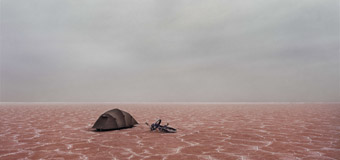meditations in pure space
kirsten krauth: michael angus, murray fredericks, salt

Murray Fredericks, Salt
courtesy the artists
Murray Fredericks, Salt
SALT BEGINS WITH ONE OF THE MOST ASTONISHING OPENING SHOTS OF RECENT FILM. WE’RE ON LAKE EYRE. LIKE THE MIRROR LAKES NEAR MILFORD SOUND IN NEW ZEALAND, WHEN LAKE EYRE HAS WATER, THE SKY REFLECTED IS SO CRYSTAL CLEAR THE JOIN BETWEEN LAND AND SKY MAKES A NEW LANDSCAPE.
A black speck emerges from right of frame. It’s difficult to make out as it glides towards us. An ambiguous image. Like a Rorschach inkblot brought to life. Is it a sea creature? An alien? A two-headed monster? As the speck hurtles towards the screen, it becomes a man on a bike, carting his photographic equipment on a trailer. It’s like he’s cycled down from the clouds.
Murray Fredericks is a landscape photo-artist. For six years he has been camping on Lake Eyre (alone for up to six weeks each time, often twice a year) and setting up his tripod, searching for “a landscape devoid of features,” pointing his camera “into pure space.” From 2006 to 2008 he also took a video camera, capturing his day to day musings on art, nature, family, grief and the complexities of surviving as an artist—in a video diary interwoven with time-lapse photography and stunning images of the lake.
Salt, a joint effort by Fredericks and co-director Michael Angus, is an amazingly accomplished short documentary considering the isolation and the difficulties of shooting in various weather conditions on the lake. With no crew on board, the lone Fredericks frames each shot carefully, capturing stillness rather than motion. His monologuing, his intimacy with the camera as we sit in the tent with him, capture his moods, etch into the silent landscape. Fredericks has a talent for words as well as images, and there’s poetry in his everyday observations or in his conversations with his wife on the phone, describing meals (his favourite, porridge, over a camp stove), honestly questioning his art-making or meditating on the nature of self and loss in such an overpowering landscape.
As with the documentaries, Contact (Martin Butler, Bentley Dean, 2009; see RT93) and Night (Lawrence Johnston, 2003, see RT83), in Salt the landscape takes over the frames, dwarfing the protagonist and his tent. Fredericks describes how being completely alone, “to the point where [he] can’t see land any more” for 360 degrees, brings him into a dream state, immersed in a void, where even the smallest sounds—brushing his teeth—become magnified, where you end up “watching your thoughts…like a television.” He drifts into a life of rituals—preparing meals, cleaning his camera equipment, continuing to work at all costs—to fight off the “negative spiral” of depression that nips at his heels, the fear that he’ll surface at the end of the trip with no wonderful images: “Is there anything lasting?”
This short film is elegantly structured with the answer to that question revealed at the very end, after the video camera is switched off. As an artist Murray Fredericks is interested in exploring “why landscapes (or images of them) move people.” His still frames are so subtle, delicate and Rothko-esque they become impossible to forget.
Salt had its world premiere at the Adelaide Film Festival in 2009 and screened in March 2010 on ABC TV’s Artscape program. The DVD can be purchased from www.saltdoco.com.
Salt, director, producer Michael Angus, director, camera Murray Fredericks, original music Aajinta, editors Lindi Harrison, Ingunn Jordansen, sound design Tom Heuzenroeder, James Currie; Jerrycan Films, 2009
This article first appeared online April 27
RealTime issue #97 June-July 2010 pg. 20






